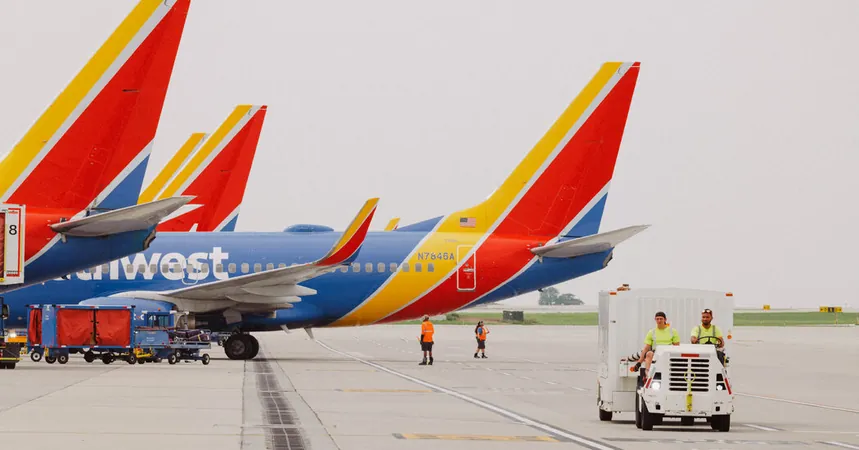
Southwest Airlines Unveils Ambitious Overhaul as Stock Prices Surge!
2024-09-26
Southwest Airlines' Revitalization Plan
In a bold move to reclaim its competitive edge, Southwest Airlines announced a comprehensive three-year plan on Thursday aimed at revitalizing operations and enhancing customer offerings. This announcement comes in the wake of mounting pressure from activist investor Elliott Management, which has called for a change in leadership and strategy due to the airline's perceived underperformance.
Key Changes in the Plan
The plan includes significant operational changes, such as introducing premium seating and red-eye flights, along with the controversial shift from a free-for-all seating policy to assigned seats starting in 2026. These changes follow months of internal assessments that highlighted customer frustrations with the existing open seating arrangement.
Expansion and Investment
Adding to the transformation, Southwest will begin offering vacation packages and forge international partnerships, with plans to connect via Icelandair starting next year from Baltimore. The airline is also set to implement a $2.5 billion share repurchase program, signaling confidence in its future prospects while striving to lower operational costs and improve efficiency in aircraft turnaround times.
Market Reaction
Following the announcement, Southwest’s stock shot up approximately 7%, reflecting investor optimism towards Bob Jordan, the airline's CEO. During the investor meeting, Jordan described the initiative as “the most transformational plan” in Southwest’s history, rooted in the principles that have fostered the airline's longstanding success.
Elliott Management's Skepticism
However, Elliott Management, which holds a 10% stake in the airline, remains skeptical. Citing concerns about the effectiveness of the current leadership, the hedge fund advocates for new board members and a change at the top, likely targeting seasoned industry professionals. Elliott has scheduled a shareholder meeting next week to propose its candidates for the board, thereby intensifying the pressure on Jordan's administration.
Response from Southwest Airlines
In response, Jordan criticized Elliott's approach, accusing them of engaging in "gamesmanship" rather than collaboration. The airline recently appointed Robert Fornaro, ex-CEO of Spirit Airlines and AirTran, as a new board member, which could be a strategic move to pacify shareholders and strengthen governance.
Industry Context
The competitive landscape for airlines has shifted dramatically in recent years, with many traditional carriers adapting to changing consumer demands by implementing premium seating and fee structures. Southwest, once a market leader that consistently reported strong profits, has struggled to keep pace. The airline now faces critics who argue that it has failed to leverage its historical strengths, with slower revenue growth and disappointing stock performance over the past decade.
Strengths and Challenges
Despite the challenges, Southwest boasts several advantages: low operating costs, manageable debt levels, and notably high customer satisfaction ratings. A recent J.D. Power report placed Southwest at the top for customer satisfaction among economy passengers, an important factor that the airline aims to maintain amid numerous changes.
Analysts' Outlook
Looking ahead, analysts from firms like Raymond James and Jefferies have expressed cautious optimism regarding the proposed changes, emphasizing that execution will be critical to the airline's success. As the industry continues to evolve, the real question remains: Can Southwest Airlines adapt without losing its unique brand identity that set it apart from other legacy carriers? Only time will tell if this ambitious overhaul will steer the airline back on course toward sustained profitability and growth.

 Brasil (PT)
Brasil (PT)
 Canada (EN)
Canada (EN)
 Chile (ES)
Chile (ES)
 España (ES)
España (ES)
 France (FR)
France (FR)
 Hong Kong (EN)
Hong Kong (EN)
 Italia (IT)
Italia (IT)
 日本 (JA)
日本 (JA)
 Magyarország (HU)
Magyarország (HU)
 Norge (NO)
Norge (NO)
 Polska (PL)
Polska (PL)
 Schweiz (DE)
Schweiz (DE)
 Singapore (EN)
Singapore (EN)
 Sverige (SV)
Sverige (SV)
 Suomi (FI)
Suomi (FI)
 Türkiye (TR)
Türkiye (TR)